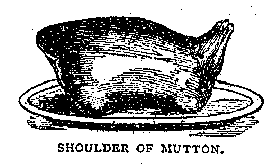Gerry
Giving (Someone) The Cold Shoulder
Recently a BFDer asked, where did this phrase originate?

The term appears to have entered common use in the early part of the nineteenth century, and Sir Walter Scott is said to have used the term frequently to describe a snub or a show of indifference to someone. However, the origins certainly go back to earlier times and many ascribe the origins to the situation where the hot meal was served to new guests but replaced with the cold shoulder of mutton when they had outstayed their welcome.
Scott certainly used the phrase thus in 1816 in The Antiquary. “The Countess’s dislike didna gang further at first then just serving the cold shouther,” and at a later stage, “I must tip him the cold shoulder or he will be pestering me for Eternity.” Both phrases implied a snub or the turning of one’s back, showing them your shoulder as you turn away in a display of emotional coldness.

The association of the phrase as literally serving the cold cut of meat is possibly a fanciful description of the origins of the phrase which probably came into existence as one of those nice alliterative aphorisms which litter the English language.
Its current meaning was well established by the nineteenth century and is attributed to Sir Walter Scott, Dickens, Thackeray and other writers of that time, possibly none having the term as an exclusive ‘first’. Its meaning, however, has persisted unchanged since it came into common usage. Dickens: “All I would say is, that I can go abroad without your family coming forward to favour me, – in short, with a parting Shove of their cold shoulders”
As is often the case, my research led me to an opposite interpretation and in the process, I found an intriguing reference that has possibly been misinterpreted by some readers as a cold send-off when, in fact, it probably means quite the opposite.
In The Life and Adventures of Bampfylde Moore Carew, King of the Beggars, (by himself, 1793), the author relates a story of a pair of sailors who go from house to house, seeking alms. On approaching the manor of Lord Weymouth, they were told by the servants that if they were not who they said they were, and could not give a convincing account of themselves, the master of the house would have them horse-whipped. The beggars had sufficient confidence in their ability to account for travels to other lands that they could not be dissuaded and continued their pleas at the kitchen door.
The housekeeper tried to turn them away but they made such convincing entreaties that she finally gave in and presented them with “…the greatest part of a cold shoulder of mutton, half a fine wheaten loaf, and a shilling, but did it with great haste and fear, lest his Lordship should see her, and be angry thereat.” In other words, complete strangers were treated with considerable generosity, the shoulder being a large piece, the loaf being fine, and a shilling thrown in to boot. The housekeeper’s gift of a ‘cold shoulder’ of mutton was warm-hearted hospitality, not a cold-shouldered act of contempt, especially considering the consequences to her of being caught.
As usual, the study of English is rarely straightforward but, overall, I think the spurning or contempt associated with ‘giving the cold shoulder’ is the most likely meaning and Bampfylde Moore Carew just got lucky – likeable rogue that he was.
Without getting too carried away, the term ‘cold’ implies emotional coldness and gives rise to many phrases, cold comfort, cold blood, cold turkey and so on. We’ll save some of those for later.
Please share this BFD article so others can discover The BFD.






